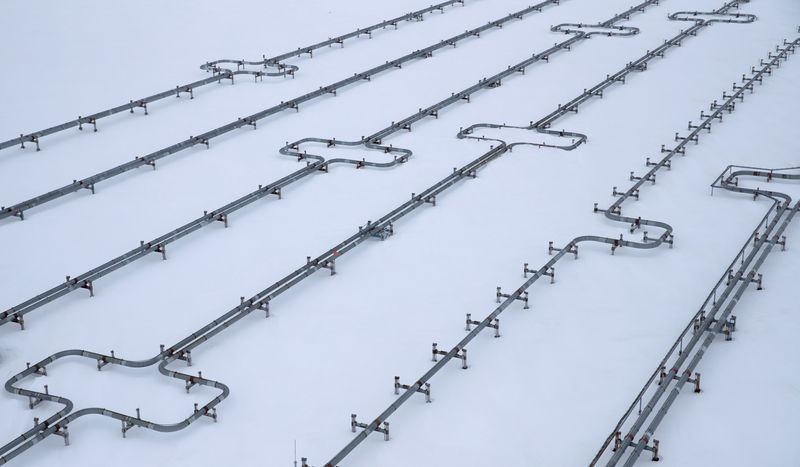Analysis-Russia’s Arctic oil feels the chill from U.S. sanctions
2025.01.14 10:29
MOSCOW (Reuters) – Russia’s vast Arctic oil business is facing major disruption from U.S. sanctions on its tankers and depots, stranding crude supplies previously snapped up by Asian buyers in storage, according to three sources familiar with its logistics.
The sanctions unveiled on Friday are the toughest yet on Russia’s oil sector, targeting major producers Gazprom (MCX:) Neft and Surgutneftegas as well as 183 vessels that have shipped Russian oil.
Three sources who spoke to Reuters on condition of anonymity said all three of Russia’s Arctic oil grades – Novy Port, ARCO and Varandey, with about 300,000 barrels of output per day – face disruption.
The vessels and infrastructure needed by Russia’s Arctic oil business, which accounts for a tenth of its seaborne oil exports, are unique, two of the sources said.
Novy Port crude from Gazprom Neft’s Novoportovskoye field, where temperatures can hit -55 C, ARCO, from the Prirazlomnaya offshore platform, and Varandey, from Lukoil’s Timan-Pechora fields, are shuttled by a special type of ice-class vessel to the Umba and Kola floating storage facilities near Murmansk.
It is then offloaded to larger vessels – Aframax or Suezmax that can carry 100,000-140,000 tons, compared to the smaller vessels’ 30,000 tons – for shipment to the international market.
The United States has now sanctioned both Umba and Kola, and more than a dozen small tankers used as shuttle suppliers of oil from the fields.
According to LSEG data, at least 15 of the tankers sanctioned by the U.S. on Friday, including the Shturman Scherbinin, Mikhail Ulyanov and Aulis, have been actively involved in shipping Russian Arctic grades during the last two months.
The smaller shuttle tankers were designed to operate in northern seas and have a specific design allowing them to load more oil without compromising keel clearance.
“There is no option to replace those quickly. Nothing like this to buy elsewhere. The vessels were specifically built for the projects,” one of the sources said.
That could leave Russia with millions of barrels of unsold oil in storage, the sources said. According to one, the limited storage capacities at all three projects mean a couple of weeks of loading disruptions might lead to cuts in output.
Lukoil did not respond to Reuters’ requests for comment, while Gazprom Neft declined to comment.
Gazprom Neft, which produces ARCO and Novy Port, was also added to the U.S. sanction package directly, although Lukoil, which produces Varandey, was not.
ASIA BOUND
Novy Port and Varandey are favoured by refiners worldwide for their high quality – both are light, with 0.1-0.4% sulphur.
The Arctic grades, which prior to a 2022 EU embargo had been purchased by refineries in northwest Europe, have more recently been snapped up by refiners in India and China.
“Light Arctic oil grades from Russia were priced above the (G7) price cap due to their premium quality,” one of the sources familiar with dealings in the Indian oil market said.
India and China have shown however that they are not ready to accept oil coming from sanctioned tankers, and have started to look for replacements for Russian oil.
The absence of Russian Arctic oil grades in the market will likely push up prices of the U.S. flagship WTI oil grade, which is also light, one of the traders in the Asian oil market said.
India reduced U.S. oil buying after it started to snap up cheap Russian barrels from the market a couple of years ago, but a source at one Indian refiner said his company is looking at buying more U.S. oil.
NO DOMESTIC LINK
As all the oil volumes from the Arctic projects are bound for export, there is no logistical system in place for them to be fed into the Russian domestic oil pipeline system.
This means that if there are no buyers for those oil grades, volumes will have to be kept in floating storage, or Gazprom Neft will need to curb output on both projects, the sources said.

One of the sources said that while there is a possibility for some supplies of the grades to be shipped via sea to some refineries in the south of Russia, that might be costly and limited in volumes.
Lukoil’s Varandey oil supplies could technically be loaded directly from its Varandey terminal straight to international markets. However, the cost of such shipments will be higher, and the company needs time to fetch replacement tankers to the region, one of the sources said.







